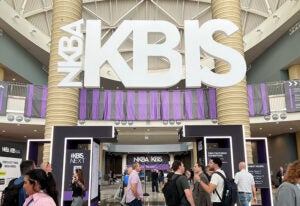

Convene‘s 32nd Annual Meetings Market Survey explored the state of the industry by surveying event professionals around the world about what’s working, what’s not, and how they are meeting uncertainty with agility and flexibility.
Here are some additional responses that shed light on the state of the events industry.
Europe & the Middle East
Patrizia Buongiorno, Vice President, AIM Group International (Italy)
What is one thing that has made your work more challenging over the past year?
The pace of transformation in the events industry has been remarkable. Clients are demanding more integrated, innovative, and measurable solutions, often with shorter timelines and tighter budgets. Balancing creativity, speed, and operational efficiency has been a real challenge.
What is one thing that has made your work more rewarding over the past year?
Seeing how our teams have embraced change with resilience and creativity has been the most rewarding part. Successfully delivering complex events that blend live, digital, and communication elements has shown the real strength of collaboration and innovation.
What has helped you stay agile and flexible in this uncertain environment?
A mindset of adaptability and continuous learning has been key. Investing in technology, empowering young talents, and fostering a culture of collaboration across teams and geographies has allowed us to remain agile and responsive to change.
Silvano Schär, Chief Commercial Officer, Congrex Switzerland
What is one thing that has made your work more challenging over the past year?
One of the main challenges has been the repercussions of the recent decision by the United States government to reduce funding to international organizations and the education sector, including many international associations headquartered in the U.S. This has had a direct impact on Geneva, as it has led to fewer international meetings being held here and lower participation in congresses. Naturally, this translates into fewer overnights and, consequently, a reduction in city tax revenues — one of the key sources that allow us to sustain our operations and promotional efforts. Coupled with the lingering perception that Geneva is an expensive destination, these external factors have made it a demanding year.
What is one thing that has made your work more rewarding over the past year?
Despite these challenges, we are proud to have achieved a new record in the number of congresses confirmed for Geneva for the years to come. This success reflects the strategic decision by the Council of our Foundation to invest in two additional team members, strengthening our convention bureau’s capacity to bid for and secure international events. In parallel, we have refined our overall strategy — deepening partnerships with key associations such as IAPCO, enhancing our communication to associations and PCOs through regular mailings and content marketing (including white papers), and intensifying our efforts to attract more non-medical conferences. Seeing these initiatives come together and deliver measurable results has been extremely rewarding for our entire team.
What has helped you stay agile and flexible in this uncertain environment?
Our agility has come from remaining close to our partners and clients, truly listening to their evolving needs, and responding with practical, flexible solutions. Collaboration is at the heart of Geneva’s DNA — between institutions, venues, hotels, and international organizations — and this spirit of partnership enables us to adapt swiftly. Additionally, by challenging misconceptions about costs and communicating the real value Geneva offers, we have been able to reposition our destination narrative and maintain our competitiveness.
Alain Pittet, Director, Geneva Convention Bureau
What is one thing that has made your work more challenging over the past year?
One of the main challenges has been the repercussions of the recent decision by the United States government to reduce funding to international organizations and the education sector, including many international associations headquartered in the U.S. This has had a direct impact on Geneva, as it has led to fewer international meetings being held here and lower participation in congresses. Naturally, this translates into fewer overnights and, consequently, a reduction in city tax revenues — one of the key sources that allow us to sustain our operations and promotional efforts. Coupled with the lingering perception that Geneva is an expensive destination, these external factors have made it a demanding year.
What is one thing that has made your work more rewarding over the past year?
Despite these challenges, we are proud to have achieved a new record in the number of congresses confirmed for Geneva for the years to come. This success reflects the strategic decision by the Council of our Foundation to invest in two additional team members, strengthening our convention bureau’s capacity to bid for and secure international events. In parallel, we have refined our overall strategy — deepening partnerships with key associations such as IAPCO, enhancing our communication to associations and PCOs through regular mailings and content marketing (including white papers), and intensifying our efforts to attract more non-medical conferences. Seeing these initiatives come together and deliver measurable results has been extremely rewarding for our entire team.
What has helped you stay agile and flexible in this uncertain environment?
Our agility has come from remaining close to our partners and clients, truly listening to their evolving needs, and responding with practical, flexible solutions. Collaboration is at the heart of Geneva’s DNA — between institutions, venues, hotels, and international organizations — and this spirit of partnership enables us to adapt swiftly. Additionally, by challenging misconceptions about costs and communicating the real value Geneva offers, we have been able to reposition our destination narrative and maintain our competitiveness.
Sissi Lignou, President & CEO, AFEA Congress, and President, IAPCO, (Greece)
What is one thing that has made your work more challenging over the past year?
One of the main challenges I’ve faced this year is still the limited recognition of our industry’s power and impact — particularly among policymakers and across other sectors. It’s clear that we need to step up our collective advocacy efforts.
IAPCO’s advocacy campaign, “Unlocking Excellence,” can serve as a key driver in achieving this much-needed recognition.
What is one thing that has made your work more rewarding over the past year?
Seeing my team happy and inspired — driven by teamwork, mutual support within our organization, and recognition from our clients — is incredibly rewarding and keeps my energy high. Additionally, my active involvement in IAPCO’s activities as president, and witnessing the engagement and enthusiasm of our community, has been deeply fulfilling.
What has helped you stay agile and flexible in this environment?
The energy and numerous benefits generated when individuals come together through events can assist our business in remaining agile and adaptable. Global unrest, policy changes, conflicts, and wars affect all aspects of society, including the international meetings and conference industry. The results of IAPCO’s Global Socio-Political Impact Survey provide a comprehensive overview of an industry navigating multifaceted pressures, from operational logistics to stakeholder confidence and financial viability.
Christine Hense, Director, People & Operations, INTERPLAN (Germany)
What is one thing that has made your work more challenging over the past year?
Very particular: A long-time colleague and friend passed away suddenly and unexpectedly. In addition to the personal grief, it was important to rebuild his team and replace his central role in the company. That was a major challenge. In general, I feel that the complexity of the demands placed on leaders is enormously increasing.
What is one thing that has made your work more rewarding over the past year?
The experience of trust and appreciation from my colleagues.
What has helped you stay agile and flexible in this environment?
I try to learn regularly. Concrete new skills and topics or by reflecting on experiences. I seek dialogue with others — both within and consciously outside my bubble.
I also find the ability to change perspectives extremely important. When dealing with complex challenges, it often helps to take a fresh look, keep your distance and allow things the time for development vs. instant reaction.
Sonto Mayise, African Export-Import Bank
What is one thing that has made your work more challenging over the past year?
One of the biggest challenges has been balancing rapidly shifting client expectations with evolving market realities. As budgets tightened and lead times shortened, the need to deliver creative, high-impact experiences without compromising quality became even more demanding.
What is one thing that has made your work more rewarding over the past year?
Seeing how we learned the importance of collaboration and innovation when hosting the Intra-African Trade Fair 2025 has been incredibly rewarding. Despite the pressures, there’s been a renewed sense of purpose and partnership across the industry … a reminder that meaningful connections are still at the heart of what we do.
What has helped you stay agile and flexible in this VUCA environment?
A strong focus on continuous learning and adaptability has been key. Whether it’s adopting new technology, rethinking event formats, or listening closely to shifting audience needs, staying curious and open-minded has allowed us to pivot quickly and confidently.
Asia-Pacific
Kayo Nomura, Managing Director at Passage Limited
What is one thing that has made your work more challenging over the past year?
Looking back on my time with the Japan National Tourism Organization (JNTO), one of the greatest challenges was motivating and supporting local convention bureaus (CVBs). For example, when JNTO aimed to highlight a specific region of Japan as a potential destination for international conferences, local government policies or priorities did not always align with our national strategy.
Rebuilding trust and confidence was essential, especially as international demand for meetings and events surged once again. Our local partners needed to adapt to new global priorities — sustainability, accessibility, and digital transformation — while maintaining their unique regional character. Navigating these changes required patience, empathy, and constant communication among all stakeholders to ensure Japan remained globally competitive while preserving its distinct cultural identity.
What is one thing that has made your work more rewarding over the past year?
The most rewarding aspect has been rediscovering the human connection that lies at the heart of business events. Since August 2021, JNTO has partnered with IAPCO on several projects — including the Hosted EDGE seminar, familiarization trips, extending invitations to IAPCO Core PCOs to Japan. Through these collaborations, I have witnessed how trust and cooperation continue to flourish, even across distance and uncertainty. Seeing people come together again — sharing ideas, laughter, and inspiration — has reminded me why I love this industry.
What has helped you stay agile and flexible in this environment?
The Way of Tea has always been my quiet teacher. Each encounter in a tea gathering is seen as ichigo ichie — a once-in-a-lifetime meeting. That philosophy reminds me to focus on the present moment, to listen deeply, and to act with sincerity. In the ever-changing meetings landscape, this mindset helps me stay grounded yet open, blending calm observation with adaptive action.
On a practical level, staying close to international colleagues and listening carefully to local contexts has allowed me to adapt with humility and curiosity.
Takao Fujitani, Business Development Assistant, Japan Convention Services
What is one thing that has made your work more challenging over the past year?
The biggest challenge would be rising costs. Not only does it influence the logistics of events, but there’s also influence on the event venue. There are a lot of venues that are undergoing renovation in Tokyo, but with the rise of construction costs, many of their schedules are insecure, thus limiting PCO’s choice of venues.
What is one thing that has made your work more rewarding over the past year?
I would say that one trend in the events industry that has made my work more rewarding is to find meaning and uniqueness in each event — I totally relate to that mindset. One of the least interesting ways to work is to stick to the precedent.
What has helped you stay agile and flexible in this uncertain environment?
The sense of crisis against AI has helped me to keep on learning and stay flexible. I’ve tried many AI services and am amazed at what they offer to the users. However, I feel that once I’m content with what these AI services offer, I won’t be able to display my individuality and would have to engage in replaceable works. I try to be ahead of AI with ideas and concept making, spending much effort in learning and trying to be flexible.
North America
Gregg Lapin, CMP, Director, Event Experience, American College of Healthcare Executives
What’s one thing that has made your work more challenging over the past year?
One major challenge over the past year has been managing rising costs. From venues to catering to audiovisual, the unpredictability of pricing and availability has required careful budgeting and creative problem-solving to deliver high-quality events without compromising the attendee experience. Additionally, engaging younger attendees with different expectations around networking, technology, and event formats has added another layer of complexity.
What’s one thing that has made your work more rewarding over the past year?
Seeing the return of in-person connections and the energy of live events has been incredibly rewarding. Despite the challenges, facilitating networking, knowledge sharing, and meaningful interactions between participants has reminded me why the business events industry is so impactful.
What has helped you stay agile and flexible in the current uncertain environment?
Staying agile has relied on anticipating change, leveraging technology, and fostering strong relationships with vendors and stakeholders.
Courtney Mesmer, CMP, DES, CED, Vice President, Events & Experience, U.S. Travel Association
What’s one thing that has made your work more challenging over the past year?
Balancing transformation with execution. We’re being asked to innovate and modernize while managing rising costs and limited resources — and that tension has tested every skill across the team. It’s been intense, but it’s also forced us to focus on what actually moves the needle and find smarter, faster ways to get things done.
What’s one thing that has made your work more rewarding over the past year?
Seeing the ideas turn into real experiences that resonate with attendees. We’ve been rethinking how our events feel — smarter formats, sharper content, and more intentional energy — and when you see that land in the room, it’s incredibly rewarding. Those moments remind you why the hard work of transformation matters.
What has helped you stay agile and flexible in the current uncertain environment?
By staying curious, connected, and clear. I keep scanning trends, listening to what’s shifting in the industry, and leaning on trusted relationships for perspective. Agility isn’t about reacting fast — it’s about staying focused on what matters most and moving with intention.
Timothy Simpson, Strategy and Design Consultant, Maritz
What’s one thing that has made your work more challenging over the past year?
We have made significant progress in incorporating new datasets into our strategy and design engagements — going beyond typical event data and psychographics to include multiple years of an organization’s commercial sales performance data. However, the inclusion of more data has slowed decision-making. The insights gained from this level of data exploration have helped client teams challenge themselves, be more thoughtful, ask more questions and have more internal cross-functional conversations. It has elevated the discussion — brought more voices to the table — and we’ve seen event leaders’ status rise within their organizations.
What’s one thing that has made your work more rewarding over the past year?
The same thing: the marriage of strategy and design with robust data analysis that goes beyond typical event data. The most rewarding part of this has been our ability to prove the ROI of event expenditure with hard data. We are leveraging advanced machine-learning technology to deliver insights into event impact that had previously been difficult or impossible to access, unlocking a level of dialogue and collaboration between us and our clients’ teams like never before. As a strategist and leader, I have found my work far more challenging and rewarding because the opportunity to leverage this level of data to challenge assumptions and old thinking, and to guide client teams, has been exponentially amplified.
What has helped you stay agile and flexible in the current uncertain environment?
I guess because of the nature of the work I get to do, I am not feeling any impact here — the work has always been fluid. So, being agile and flexible is just the nature of who I am and what I do.
Liz Lathan, CMP, Cofounder, Club Ichi and The Community Factory
What’s one thing that has made your work more challenging over the past year?
I can tell you that the community we speak with daily is feeling the budget pressure more than anything. But it might not be what you’re thinking: It’s less about “doing more with less” (everyone’s used to that) and more about the unpredictable nature of the costs that used to be predictable. From tariffs affecting swag, new AV equipment, and even the cost of coffee, to the new costs (and approval timelines) for travel visas.
What’s one thing that has made your work more rewarding over the past year?
Attendees are feeling more grateful than ever to come together in person. More micro-events and more format changes that lend to more conversations are driving happier attendees and the cool thing is that feedback is making it to the event professionals who are doing the planning. It feels more rewarding than ever.
What has helped you stay agile and flexible in the current uncertain environment?
Event professionals report that they are able to be more agile by building a tighter relationship with the CFO organization and more collaboration with agency partners to understand what elements are financially flexible.
Matthew Fox, Senior Director of Event Logistics, Client Events, Scoop News Group
What’s one thing that has made your work more challenging over the past year?
The government shutdown. My organization’s meetings focus on connecting the tech sector with the public sector, and with the government shutdown, that has not been possible. We have had to cancel and move many conferences, roundtables, and other events (up to 20 and counting).
What’s one thing that has made your work more rewarding over the past year?
Being in my position for 2.5 years, I have gained both efficiencies in the planning, as well as more context into the content, subject matter, and awareness of what my shows accomplish.
What has helped you stay agile and flexible in the current uncertain environment?
Partnerships. In doing almost 50 events a year in Washington, D.C., we use a lot of the same vendors week over week. Having strong relationships and lines of communication with vendors helps massively in managing expectations, ensuring on-site success, as well as the ability to pivot if and as corporate needs and changes arise.
Robin Preston, CEM, DES, Managing Director, Events, The American Institute of Architects
What is one thing that has made your work more challenging over the past year?
What’s definitely made it challenging is all of the things going on politically with the U.S. [administration] around tariffs, deportation, change in DEI, threats to funding, government closing (the latest), uncertainty in employment, especially in the federal sector, and the potential or pending VISA fee. All of these things have made it challenging to get attendees to register and travel to meetings and events. As well as the challenge of running an organization with the uncertainty that’s been created.
What’s one thing that has made your work more rewarding over the past year?
The rewarding part continues to be the spark, joy, excitement and connections that are made because of the events we produce.
What has helped you stay agile and flexible in this uncertain environment?
The support from organizational leadership as we continue to chart unfamiliar waters with all the changes taking place in the US and abroad.
Josh Henry, Meetings Manager, SPIE, the International Society for Optics and Photonics
What is one thing that has made your work more challenging over the past year?
One of the biggest challenges over the past year has been the sporadic freezes on business travel for government employees. This has made it increasingly difficult to forecast attendance and has complicated programming decisions, especially for events that typically draw a large number of government-affiliated participants. Additionally, the growing scrutiny and backlash against DEI initiatives has created significant tension both internally and across our broader membership. Even subtle references that could be interpreted as DEI-related are now subject to heightened scrutiny, and in some cases, have prevented key members from participating in our events.
What is one thing that has made your work more rewarding over the past year?
One of the most rewarding aspects of my work this past year has been the sense of forward momentum. 2025 truly felt like the year we moved beyond the shadow of COVID and began planning with intention for a post-pandemic world. Our audiences have become noticeably less formal, and we’re seeing a growing emphasis on meaningful, interpersonal experiences at our events. This shift has given us the opportunity to reimagine our approach, explore new ideas, and find creative ways to engage our community that feel fresh and relevant.
What has helped you stay agile and flexible in this uncertain environment?
Two key tools: effective communication and strong vendor relationships. Clear, transparent communication, especially around the context and reasoning behind decisions, has fostered greater understanding and collaboration among our constituents and partners. When people understand the “why,” they’re more likely to be flexible and supportive. At the same time, we’ve leaned more heavily on our vendor partnerships. Staying closely connected with CVBs, hotel and venue teams, and on-site vendors has allowed us to stay ahead of industry trends, identify meaningful solutions to emerging challenges, and build partnerships that help mitigate negative impacts for everyone involved.





















